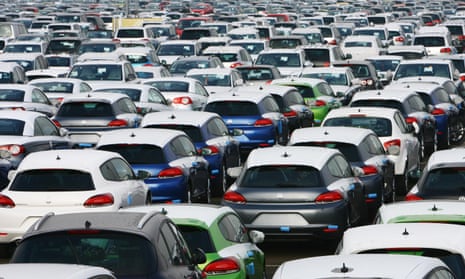New cars imported from the European Union could rise in price by £1,500 if the UK leaves the single market, according to a warning by the industry’s lobby group.
The Society of Motor Manufacturers and Traders said failure by the government to retain access to the single market after Brexit could cost the industry and consumers £4.5bn a year in export and import tariffs.
Urging the government to “make the right decisions” and secure access to the single market, the SMMT said EU tariffs of 10% on cars could add at least £2.7bn to import costs and £1.8bn to exports.
“Import tariffs alone could push up the list price of cars imported to the UK from the continent by an average of £1,500 if brands and their retail networks were unable to absorb these additional costs,” it added.
Based on the average price of a new car sold in the UK of £23,029, it would amount to a 6.5% rise. The average UK-built car has about 6,000 parts, the majority of which come from the EU.
The SMMT backed the remain camp in the run-up to the EU referendum, and is now campaigning on behalf of its members to stay within the single market.
Addressing industry leaders and government officials at its 100th annual dinner in London, the SMMT’s president, Gareth Jones, said: “We must make the right decisions on trade, on regulation and on business competitiveness. [The industry wants] membership of the single market, consistency in regulations, access to global talent and global markets, and the ability to trade abroad free from barriers and red tape.”
Britain’s car industry has enjoyed a period of strength over recent years, as cheap finance deals and more efficient models attract consumers. New car sales are on course for a fifth consecutive year of growth in 2016, and 2015 marked a 10-year high for car manufacturing.
Jones said: “The renaissance is down to years of hard work, hard won investment and long-term collaborative partnership between industry and government. We operate in an intensely competitive environment. We need to create the right conditions for future competitiveness.”
The SMMT warned earlier this month that British car manufacturing was at risk of “death by a thousand cuts” if companies invested in other countries rather than the UK after the Brexit vote.
The dinner coincided with a new report by the SMMT and KPMG which said progress in digital manufacturing could add £6.9bn to the UK car industry’s annual turnover. The report claimed new technologies such as 3D printing and more effective use of data could contribute £74bn to the wider UK economy over the next two decades, as well as cutting the time consumers have to wait for a new car by a third.
John Leech, head of automotive for KPMG in the UK, said: “The UK automotive industry is already the most productive in Europe but faces increasing competition from lower cost countries and uncertainty following the UK’s vote to leave the EU.
“The application of digital technologies to the design and manufacture of vehicles will help to secure the industry’s competitiveness in the decades to come.”









Comments (…)
Sign in or create your Guardian account to join the discussion